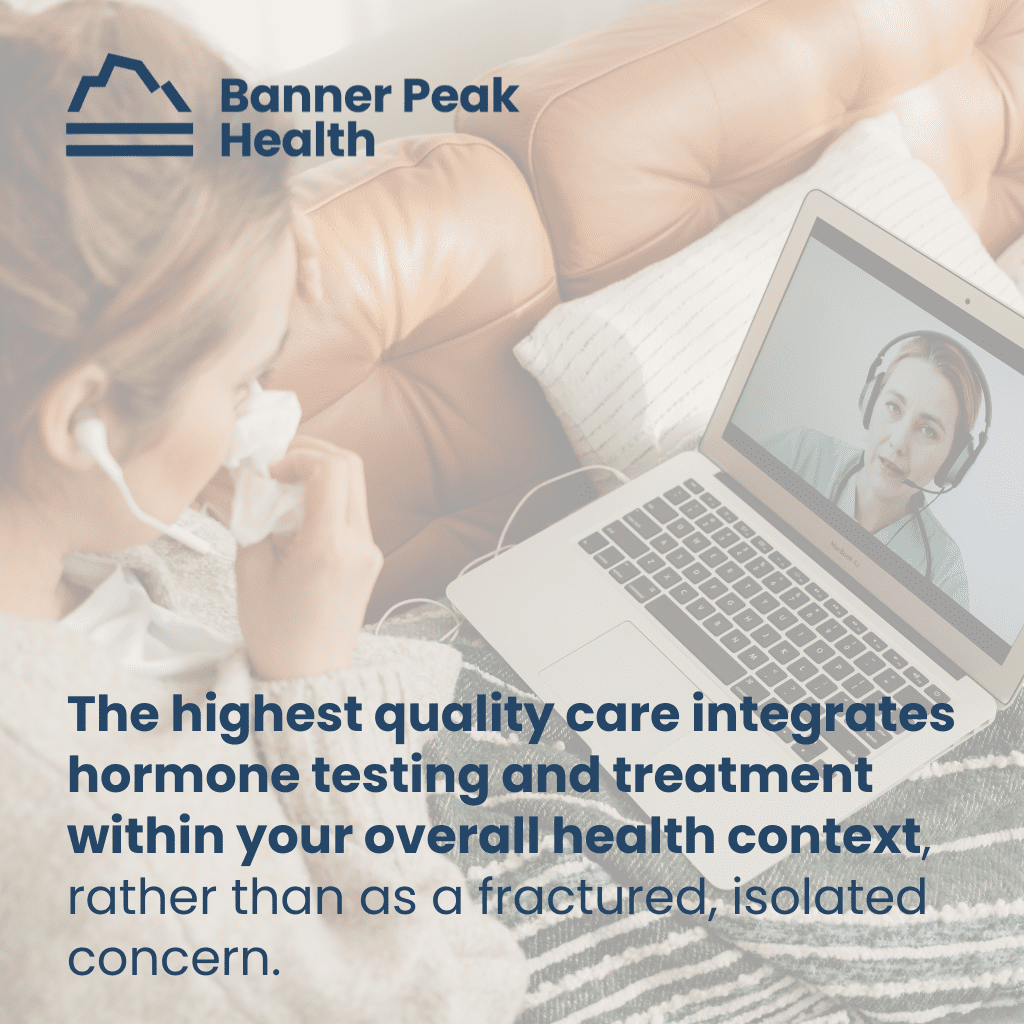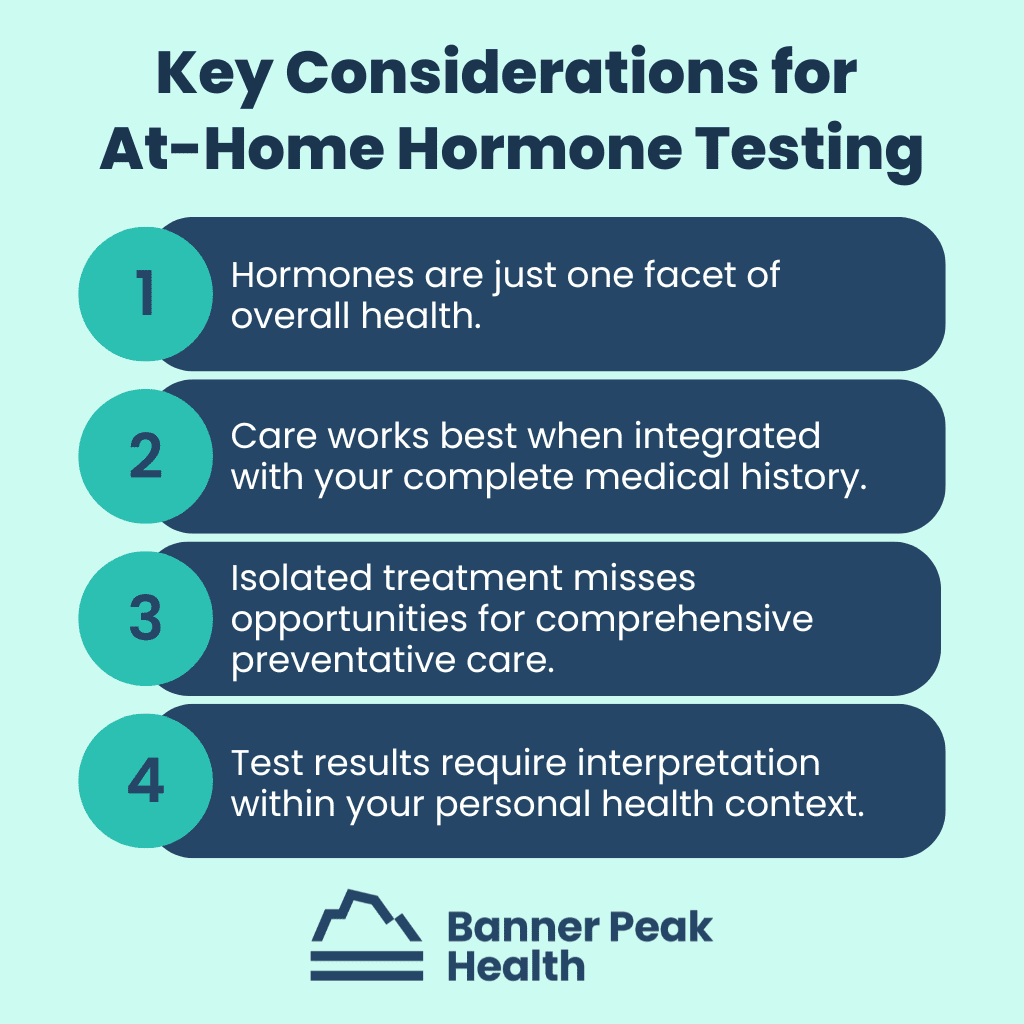The light bulb has to want to change.
I recall the Theranos debacle. Elizabeth Holmes claimed her Edison machine could perform complex blood tests from a pinprick of blood. Before the machine was exposed as fraudulent, I had concerns with the company’s premise: that laboratory results have greater value when placed directly in patients’ hands, bypassing physician interpretation.
Medical care works best as a collaborative relationship between the patient and the doctor. Physicians provide crucial guidance in selecting appropriate tests, analyzing results, and developing therapeutic plans.
What happens when traditional healthcare abandons entire categories of care? What happens when profit motives create what I call “diagnostic deserts”: areas where patient needs go unmet?
The Largest Diagnostic Desert: Menopausal Care
The most expansive diagnostic desert concerns menopausal care.
This void created space for numerous online companies offering at-home hormone testing and treatment for menopausal women. While these services provide valuable care that might otherwise be unavailable, they signal the traditional healthcare system’s abdication of responsibility.
To understand how we arrived here, we must examine the Women’s Health Initiative (WHI) study and its profound impact on hormone replacement therapy.
The WHI Study: A Pivotal Misstep
FDA approval in 1942 made Premarin, a conjugated equine estrogen from pregnant horse urine, available for menopausal symptom relief. By 1975, research showed estrogen taken without progestin increased endometrial cancer risk, so standard practice evolved to include both hormones for women with intact uteruses.
Despite millions of women using these medications for decades, no large, long-term randomized controlled trial had assessed their risks and benefits. The Women’s Health Initiative launched in 1993.
The $260 million WHI study aimed to determine whether estrogen plus progesterone reduced coronary artery disease risk, with a secondary focus on breast cancer risk. The study planned to follow participants for nine years but stopped after five years in 2002, citing safety concerns.
The circumstances surrounding this early termination were highly unusual:
- The lead author held a press conference one week before publishing the study.
- This timing prevented others from analyzing the data before media coverage began.
- The press release stated “26% higher rates for breast cancer” without proper context.
- Media headlines declared “Hormone therapy causes cancer” and “Millions at risk.”
These events triggered a massive retreat from hormone replacement therapy. The FDA added their most severe black box warning. It stated estrogen and progestin can cause breast cancer and increase coronary artery disease. Usage plummeted as physician interest disappeared.
The Flawed Analysis
The WHI study and its interpretation contained multiple serious flaws:
- The lead author issued a press release without collaborating with co-authors. Highly atypical for medical research.
- The “26% increased risk” headline misrepresented the data. The absolute numbers showed one extra case of invasive breast cancer per 1,000 women per year, with no statistical increase in mortality.
- The study used older medications (oral Premarin and synthetic Provera) with higher side effect profiles than current treatments (topical estradiol and micronized progesterone).
- Most significantly, researchers selected the wrong population. The average participant was 63 years old and 12 years post-menopause. This is far different from current practice, which begins treatment around age 51, when menopause typically occurs.
The True Cost
This flawed study removed hormone replacement therapy as an option for an entire generation of women, resulting in inadequate treatment of:
- Vasomotor symptoms (hot flashes and night sweats)
- Urinary symptoms
- Fatigue
- Brain fog
- Depression
- Metabolic syndrome
More research reveals what these women missed. A 2016 New England Journal of Medicine meta-analysis examining women under 60 and less than 10 years post-menopause found hormone replacement therapy associated with:
- 32% lower risk of dying from a heart attack
- 39% lower risk of all-cause mortality
Inadequate estrogen contributes to Alzheimer’s disease, which affects women at twice the rate of men.
Hormone Testing at Home
Traditional medicine has abandoned women’s hormone health, allowing alternatives to emerge. Today’s telehealth industry offers at-home hormone testing and treatment options for menopausal women.
Patients often ask if these services constitute legitimate medical care. The answer isn’t simple.
At-home hormone testing provides a pathway for women whose concerns have been dismissed by traditional physicians. The at-home hormone tests themselves are legitimate, and many online providers offer consultation with qualified physicians who interpret results and prescribe appropriate therapy.
However, hormone testing at home and receiving care through telehealth platforms have limitations:
- Hormones are just one facet of overall health.
- Care works best when integrated with your complete medical history.
- Isolated treatment misses opportunities for comprehensive preventative care.
- Test results require interpretation within your personal health context.
Today’s Takeaways
Traditional medicine failed to change the light bulb of menopausal care. Online telehealth companies fill this void with high-quality at-home hormone testing options, benefiting many women.
However, the highest quality care integrates hormone testing and treatment within your overall health context, rather than as a fractured, isolated concern.
When considering how to test hormone levels at home:
- Work with your primary care physician first.
- If they dismiss your concerns, seek a practice that follows current evidence rather than outdated studies.
- Ensure whoever interprets your hormone test results has your complete medical history.
At Banner Peak Health, we stay current with the latest evidence and best practices. Flawed analyses from decades past don’t sway us. We provide personalized, evidence-based care within the context of your total health needs.
Your health deserves more than fragmented care in diagnostic deserts.


Barry Rotman, MD
For over 30 years in medicine, Dr. Rotman has dedicated himself to excellence. With patients’ health as his top priority, he opened his own concierge medical practice in 2007 to practice medicine in a way that lets him truly serve their best interests.




